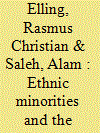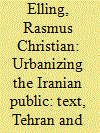|
|
|
Sort Order |
|
|
|
Items / Page
|
|
|
|
|
|
|
| Srl | Item |
| 1 |
ID:
143590


|
|
|
|
|
| Summary/Abstract |
The present review essay is of a novel format: two authors working in the same field introduce each other's works, and then pose a number of questions to each other. The aim is to facilitate dialogue between scholars occupied with similar issues, theories, methods or problems, and to share their discussions with others. Here, Alam Saleh, Lecturer in Middle Eastern Politics, University of Exeter, and Rasmus Christian Elling, Assistant Professor of Iranian Studies, University of Copenhagen, introduce each other's recent books on ethnic minorities, identity and nationalism in post-revolution Iran. These introductions are then followed by questions and answers in relation to the topics covered by the books.
|
|
|
|
|
|
|
|
|
|
|
|
|
|
|
|
| 2 |
ID:
189527


|
|
|
|
|
| Summary/Abstract |
By uncovering and scrutinizing the politics of labour during the Second World War in the world’s biggest oil refinery – located in the city of Abadan in Iran’s southwestern province of Khuzistan – this article aims to strengthen our understanding of the Second World War in the Middle East generally and our understanding of the role of oil company power in Iran specifically. By analysing changes in and around the urban oil industry complex at Abadan, the present article will thus provide new insights into British imperial strategy in the context of the 1941–1946 British–Soviet occupation of Iran. We argue that the Anglo–Iranian Oil Company, in partial concert with British state and military actors and institutions, managed to turn threats and challenges arising from the war into opportunities for expanding power and experimenting with a new security regime that was designed to curb rising socialist and anti-colonial nationalist activism. This overlapping history of the Second World War, oil, labour and empire, then, is not only key to a fuller understanding of Iran, the Middle East and the world on the cusp of the Cold War but can also contribute to the historical analysis of energy imperialism.
|
|
|
|
|
|
|
|
|
|
|
|
|
|
|
|
| 3 |
ID:
085157


|
|
|
|
|
| Publication |
2008.
|
| Summary/Abstract |
By analysing the symbols and language employed in official statements on two cases of ethnic minority unrest in Iran in 2005-6, the article shows how the Islamic Republic's ideologues and leaders are responding to threats against national security and to alternative definitions of identity. In this emerging discourse, religious and secular notions of patriotism and loyalty are interwoven and an Islamist/nationalist conceptualisation of Iranian nationhood is defended. This interesting process of paradoxical dynamics is an important part of the ongoing struggle to define the identity of Iran in a region boiling with political and cultural conflicts.
|
|
|
|
|
|
|
|
|
|
|
|
|
|
|
|
| 4 |
ID:
164911


|
|
|
|
|
| Summary/Abstract |
By using the heuristic device of transpatialization and the methodology of urban cultural studies, this article argues that the 1922 serialized novel Tehrān-e Makhuf (Dreadful Tehran) by Seyyed Mortaza Moshfeq-e Kazemi (1902–1978), with its distinctly urban modes of imagination and production, at once reflected and propelled a process that can be termed the urbanization of the Iranian public. The article analyses the literary techniques with which Moshfeq contributed to this process; the circumstances and context in which the novel was produced; and the ideological change reflected in the author and his work. The article thus sheds light on a crucial stage in modern Iranian history by unravelling some of the socio-spatial intertwinements that made that history.
|
|
|
|
|
|
|
|
|
|
|
|
|
|
|
|
|
|
|
|
|